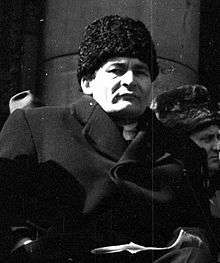Ferenc Erdei
| Ferenc Erdei | |
|---|---|
 | |
| Minister of the Interior of Hungary | |
|
In office 21 December 1944 (officially 27 March 1945) – 15 November 1945 | |
| Preceded by | Gábor Vajna |
| Succeeded by | Imre Nagy |
| Personal details | |
| Born |
24 December 1910 Makó, Kingdom of Hungary, Austria-Hungary |
| Died |
11 May 1971 (aged 60) Budapest, Hungary |
| Political party | National Peasant Party |
| Profession | sociologist, politician |
Ferenc Erdei (24 December 1910 – 11 May 1971) was a Hungarian politician, who served as Interior Minister in the unofficial interim government led by Béla Miklós. After the Soviet occupation of Hungary this cabinet took office officially, in March 1945. Under communist rule, Erdei served as minister of agriculture in 1949–53 and was responsible for the "attic sweepings" and other coercive happenings and atrocities in the villages. In July 1953 he was appointed minister of justice.
Erdei became a deputy prime minister during the Hungarian Revolution of 1956, and as such was one of the leaders of the Hungarian delegation who negotiated abortively with the Soviets. On 3 November he was arrested together with Minister of Defence Pál Maléter, but after some weeks Erdei was released after an intervention by János Kádár.
In 1957 he became secretary-general of the Hungarian Academy of Sciences. He received a Kossuth Prize twice, in 1948 and 1962. He was also secretary-general of the National Council of the Patriotic People's Front between 1964 and 1970.
References
| Political offices | ||
|---|---|---|
| Preceded by Gábor Vajna |
Minister of the Interior 1944–1945 |
Succeeded by Imre Nagy |
| Preceded by István Csala |
Minister of Agriculture 1949–1953 |
Succeeded by András Hegedüs |
| Preceded by Béla Kovács |
Minister of Justice 1953–1954 |
Succeeded by Erik Molnár |
| Preceded by András Hegedüs |
Minister of Agriculture 1954–1955 |
Succeeded by János Matolcsi |